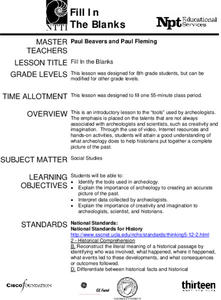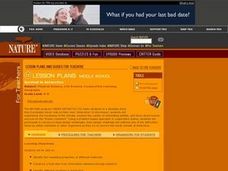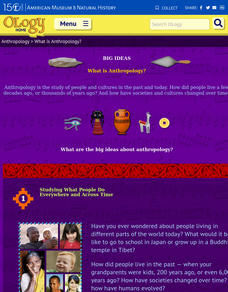Global Oneness Project
Living with Less Water
Did you know that California produces two thirds of the fruits and nuts consumed in the United States? That it produces almost one third of the vegetables? Did you know that scientists warn that California is facing the onset of a...
Benjamin Franklin Tercentenary
Science Pen Pals
Students explore the scientific career of Benjamin Franklin. For this science lesson, students discuss Franklin's correspondence with other scientists and write letters describing Benjamin Franklin's experiments.
British Heart Foundation
Women in Science: A Timeline
Scroll down an engaging webpage to discover a plethora of women whose contributions shaped the science world from 1865 to today. Science enthusiasts follow a red guideline to read brief blurbs, watch videos, and examine photographs.
Benjamin Franklin Tercentenary
Designing Benjamin Franklin: In Search of a Better World
How do you convey someone’s creativity? Individuals answer the question as they design exhibitions to showcase the intellect and genius of Benjamin Franklin. After conducting research, classmates work in groups to try to capture and...
Curated OER
If I Could Be An Inventor, I Would Invent...
Students create an invention. For this scientific technology lesson, students discuss inventors and how their inventions helped others. Students brainstorm ideas for inventions and their rationale behind it. In small teams, students...
Curated OER
Niels Bohr
In this online interactive history quiz instructional activity, students respond to 51 multiple choice questions about Niels Bohr. Students may submit their answers to be scored.
SeaWorld
Animal Migrations
Here is a fabulous set of activities for your young scientists. Each lesson contains map, hands-on, and game activities that will help the class understand why and how animals migrate from one place to another. First they'll examine the...
Curated OER
Pharmaceuticals and Treatments
Learners perform an experiment involving reverse transcriptase-polymerized chain reaction HIV replication to better examine the biotechnology used by scientists in pharmaceutical research of infections diseases like HIV. Students examine...
Curated OER
Rock On!
After five class sessions, young scientists will be able to identify common rock types: igneous, sedimentary, and metamorphic. This plan involves hands-on activities, includes various handouts and worksheets, and requires there to be...
PBS
Lessons - Feeling Hot, Hot, Hot!
Volcanoes are among the most spectacular geological features on the planet. Jump into an exploration of these amazing phenomenon with this multimedia lesson series. Working collaboratively in small groups, young scientists view videos...
NOAA
A Moving Crust
Young scientists piece together the geological puzzle that is the earth in the third and final instructional activity of this earth science series. With the help of numerous multimedia resources and a series of engaging hands-on...
Montana State University
What's the Weather?
How many jackets do you need to stay warm and climb Mount Everest? An informatie resource covers the topic of Mount Everest, the resource helps young scientists discover the difference between climate and weather. Activities include...
National Woman's History Museum
Stacey Abrams: Changing the Trajectory of Protecting People’s Voices and Votes
In this project-based learning lesson, young social scientists investigate Stacey Abrams' campaign to protect the voting rights of people across the nation. Investigators learn how to annotate assigned articles, watch videos, and collect...
Curated OER
Earth, The Universe, And Culture
Students examine how science is interpreted based on social environments. They watch and discuss a video, identify scientists and locate their countries of origin on a map, explore various websites, and complete a handout.
Curated OER
Volcanoes!: Eyewitness Accounts
Students review previous lessons about volcanoes and name the phenomena they think the eyewitnesses of the Mount St. Helens witnessed. They play the roles of reporter, eyewitness and scientists who are serving on a committee...
Curated OER
Fill in the Blanks
Archaeologists, historians, and scientists all work together to create a timeline of our past. Engages learners in a series of activities that all filter through the NOVA video, "Mysteries of the First Americans." Each activity is...
Curated OER
Survival in Antarctica
Explore the harsh climate of Antarctica and its wildlife. Participate in experiments to determine how humans survive in the continent's climate, and address the difficulties faced by scientists.
Curated OER
Branches of Earth Science
Connect earth science to science occupations and real-life events with this learning exercise and activity. After listing the 4 branches of earth science, learners spend some time brainstorming two activities each type of earth scientist...
NOAA
A Watery World
With about 70% of the earth's surface covered in oceans, it's fair to say that we live in a very wet world. Young scientists gain a better appreciation of this fact as they use maps to identify the world's ocean basins in the first...
Curated OER
Climate Change
Rising sea levels, strong storms, melting ice ... who or what is to blame? Scholars browse the website in preparation for a class discussion or debate about whether human activity is causing climate change. They gain a balanced...
American Museum of Natural History
What is Anthropology
A colorful resource introduces learners to the four major fields of anthropology: cultural anthropology, linguistic anthropology, biological anthropology, and archaeology. Explanations are provided for what each field studies, the kinds...
Curated OER
Scientists Breed See-Through Frogs
Students participate in a pre-reading activity, then read a news article about the breeding of transparent frogs. For this biology and current events lesson, the teacher introduces the article with a question and a vocabulary activity,...
Curated OER
Scientists Discover Giant Frog Fossil
Students examine a world map and read a news article about the discovery of a giant frog fossil. For this earth science and current event lesson, the teacher introduces an article with a discussion about continental drift and a...
Curated OER
Scientists Find 27 New Species in Caves
Young scholars share their knowledge of creatures that live in caves, then read a news article about new cave animals that have been found in California. In this current events lesson, the teacher introduces the article with a discussion...
Other popular searches
- Famous Scientists
- Famous Scientists Alive
- 10 Famous Scientists
- Cell Theory Scientists
- Famous Scientists Botany
- Social Scientists
- Famous Scientists From Italy
- 5 Famous Scientists
- Famous Scientists Reports
- Famous Scientists Project
- 40 Famous Scientists
- Famous Scientists in Florida

























